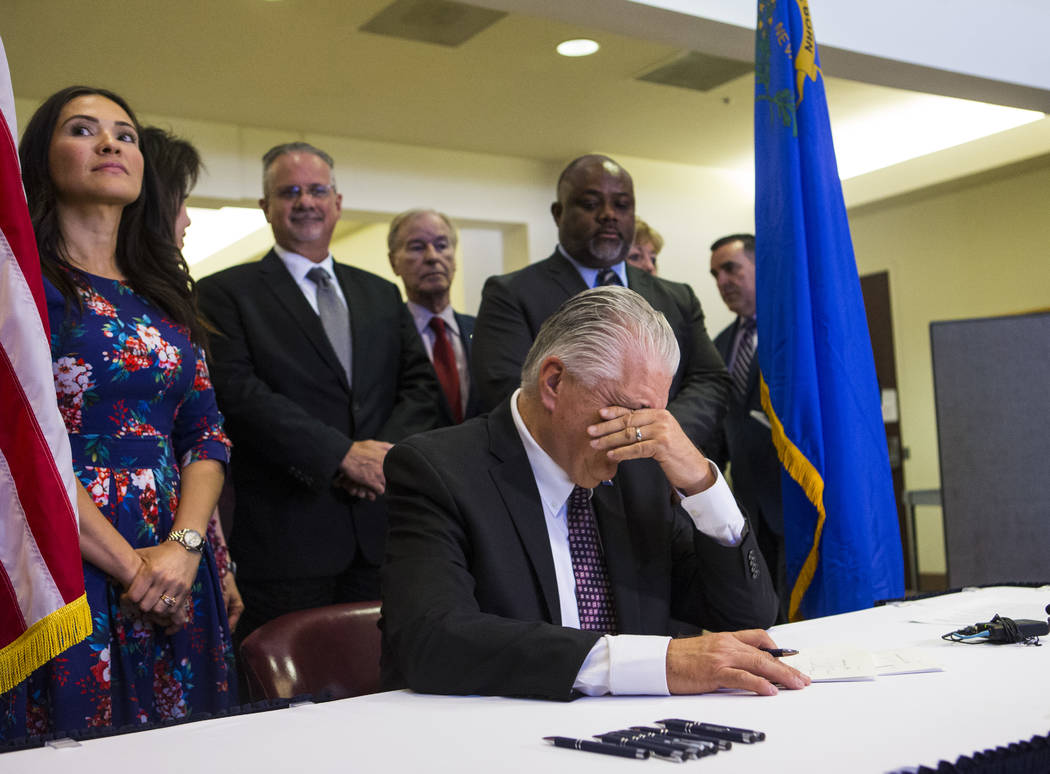STEVE SEBELIUS: Sisolak signs good bills on gun control, voting rights
Friday was the deadline for Gov. Steve Sisolak to sign bills passed by the 2019 session of the Nevada Legislature, and he did not slack off.
At various locations throughout Las Vegas, Sisolak signed more than a dozen bills on subjects including gun control and voting rights, which will have real impacts on public safety and participation in democracy.
Assembly Bill 291 bans bump stocks, 19 months after they were used to commit the largest mass shooting in American history at the Route 91 Harvest festival in Las Vegas. It requires the safe storage of firearms, after years of reports of children gaining access to firearms with tragic results. It lowers the blood- alcohol level to legally posses a firearm from 0.10 to 0.08, to match the state’s DUI standard.
It also allows family members or law-enforcement officers to request an order from a judge to confiscate the firearms of people whom a judge agrees by preponderance of the evidence pose a risk of personal injury to themselves or others. An initial order can last seven days, while an extended order (subject to a higher standard of proof) can last for one year.
That “red flag” provision comes after numerous shootings in which people expressed concern about the mental health of a person who ended up committing a mass shooting but were unable to take any action because no crime had yet been committed. This was the case in the February 2018 shooting in Parkland, Fla., Sisolak noted at the bill signing.
AB291, as well as a bill Sisolak signed earlier in the session, Senate Bill 143 — which enacts universal background checks for all gun sales including those between private parties — are reasonable (and fully constitutional) steps toward preventing future incidents of gun violence. While the ubiquity of firearms in America makes eliminating all gun murders nearly impossible, it should not be an excuse to prevent us from doing everything we can within the law and the Constitution to make those murders less common.
Sisolak also signed Assembly Bill 345, a bill with the worthy goal of making it easier for eligible citizens to vote.
The bill extends the deadline to register to vote in an election, and even provides for same-day voter registration if the person provides “proof of identity and residence.” In some circumstances, late-registering voters can cast only provisional ballots, which are counted only if the voter’s eligibility is later established. It also enacts the provisions of an initiative that requires automatic voter registration at the DMV unless a person specifically opts out of registering.
The bill also allows county or city clerks to extend early voting hours beyond the minimum required by the state.
All of these provisions will advance a laudable goal: Boosting voter turnout and participation in democracy.
There are those who argue that self-government in a democratic republic such as the United States is a solemn privilege, and that people should have to pay attention to deadlines to register to vote, to update their voter registration and to take the time to exercise the franchise at a given time on a given day. Making it easier cheapens that responsibility, the theory goes.
But this “democracy as a noble chore” approach is thinly veiled contempt for people who, because of their jobs or other circumstances of life, may not pay attention to elections until the very end. They mistake last-minute voters for frivolous ones, for whom voting should be denied because homework has not been done.
It doesn’t necessarily follow, however, that voters who come late to the election are uninformed. And putting roadblocks in the way is contrary to what should be our goal: getting every eligible, registered voter out to the polls, either in early voting or on Election Day. If government exists by the consent of the governed, why shouldn’t the greatest number of those governed have a say in how that government runs?
And along those lines, Sisolak also signed Assembly Bill 50, a long-overdue reform that will consolidate those low-turnout, off-year municipal elections with even-year contests for president, Congress and state offices. Only Ely, Fallon, Boulder City, Caliente, Henderson, Las Vegas, North Las Vegas and Yerington still held the odd-year elections, but under AB50, this year’s contests will be the last.
It’s a welcome change: Over the past 20 years, average turnouts in general elections have barely exceeded 15 percent overall. And when the city of Mesquite switched from odd-year to even-year contests, turnout soared.
Elected officials lamented the difficulty of running near the bottom of the ballot when top-of-the-ticket races such as president and Congress suck up all the media and voter attention (to say nothing of fundraising dollars). But the cost to taxpayers of off-year elections and the paltry turnout made this change an easy call.
Contact Steve Sebelius at SSebelius@reviewjournal.com or 702-383-0253. Follow @SteveSebelius on Twitter.

















